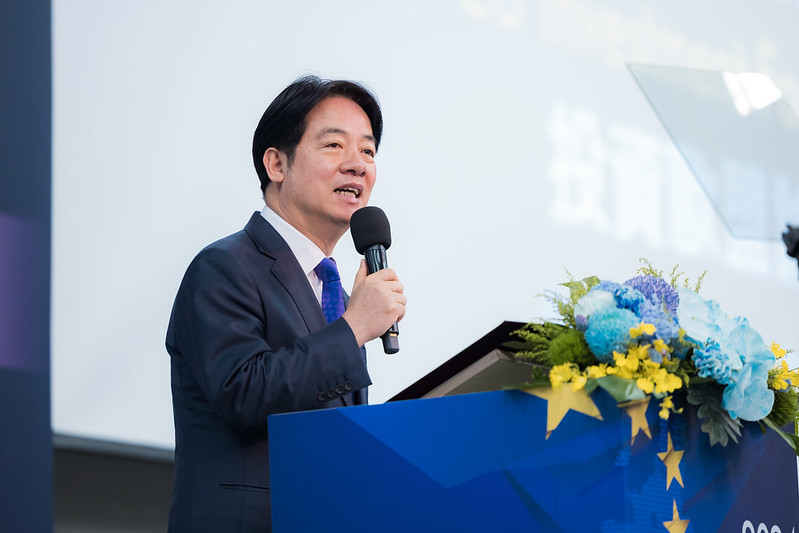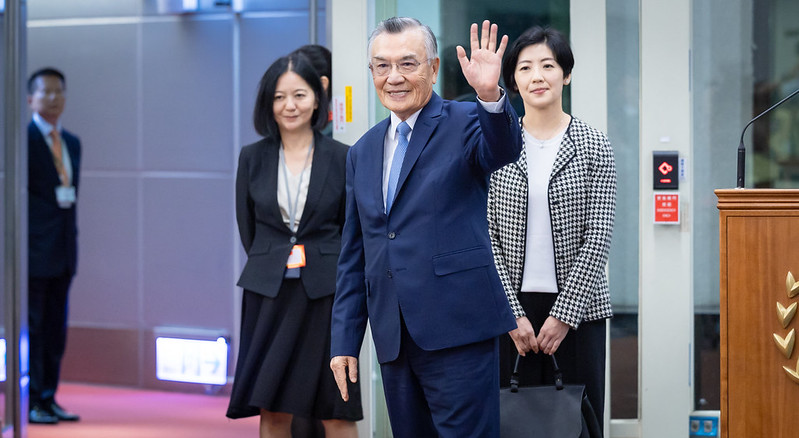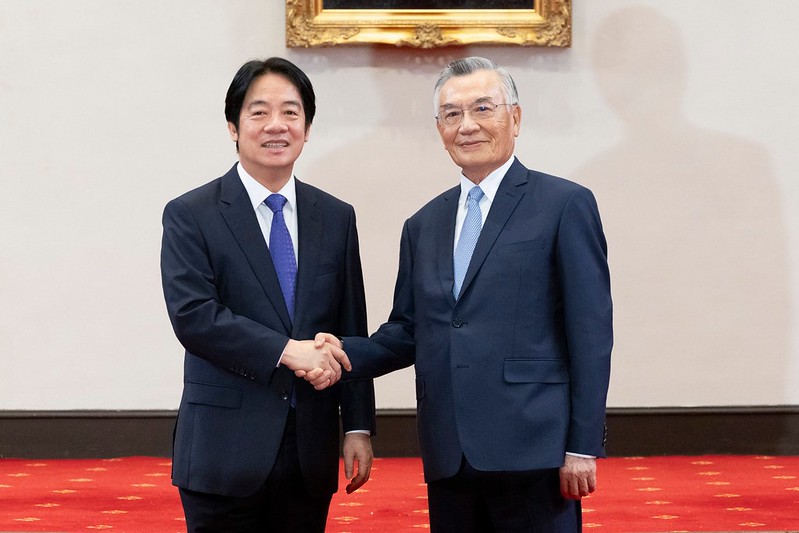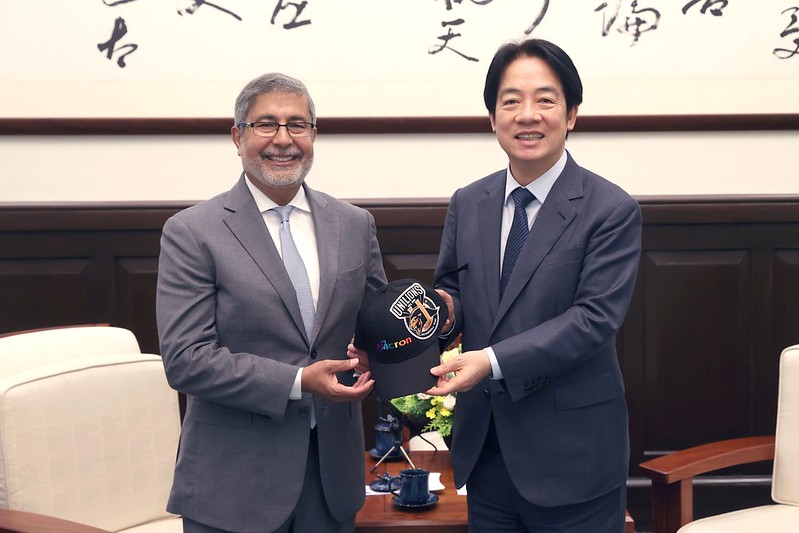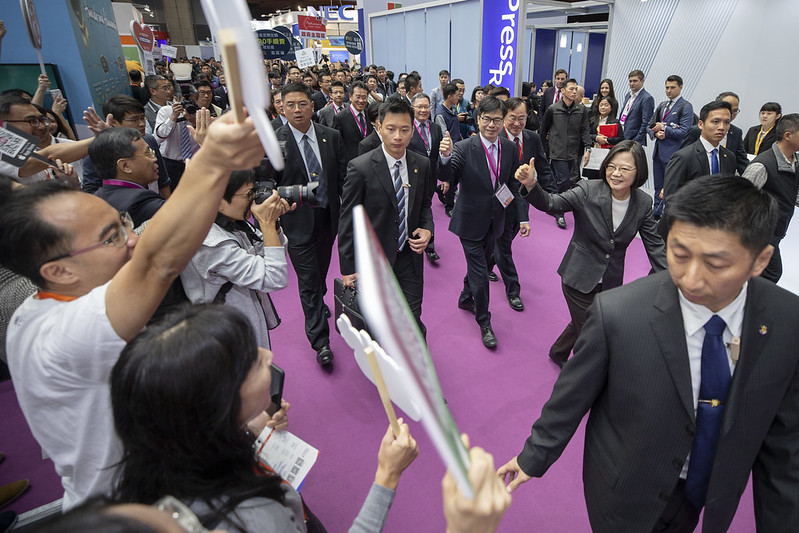News & activities
 News releases
News releases
While attending the opening ceremony of FinTech Taipei 2019 on the morning of November 29, President Tsai Ing-wen pointed out that in response to the arrival of FinTech, changes in the international sphere, and challenges the new state of financing has brought for domestic financial firms, the government will help drive industry and help it grow, transforming Taiwan into Asia's center for enterprise capital management and high-end asset management. We are going to learn from the experiences of other advanced countries to create a national financial guarantee system for major economic development projects, she said.
A translation of the president's remarks follows:
FinTech Taipei is Taiwan's largest FinTech event. So on behalf of Taiwan, I want to welcome participants and guests from all around the world. I also want to thank the event organizers for working so hard to create this platform to bring Taiwan's FinTech innovations onto the international stage.
More than 32,000 people attended last year's inaugural FinTech Taipei exhibition. This year's exhibition space is twice the size of last year, and we have seen a sharp increase in participating companies and countries. This shows that FinTech Taipei has already achieved international recognition.
Taiwan's financial sector achievements did not develop overnight. I want to take this opportunity to share with all of you the three major challenges we are facing, and how we are actively addressing them.
First is the arrival of FinTech and the challenges it brings.
Technological innovation is bringing immense changes to finance across the board, and over the past few years, FinTech has become the focus of the financial sector. Taiwanese firms have been very ambitious on this front. In 2018 alone, they invested NT$11.7 billion in developing FinTech, marking a year-on-year growth rate of 52%. This year, we will see an even more outstanding growth rate.
It is the government's job to help drive industry and help it grow. That is why our administration has formulated policies in line with new developments like mobile payment, internet-only banking, and blockchain.
Last year, we completed legislative work to make Taiwan the first country in the world to adopt a regulatory sandbox system using a special law. This will allow innovative Taiwanese firms to test new products and services more quickly.
The Financial Supervisory Commission (FSC) has also launched FinTechSpace, which provides resources for innovative R&D as well as advisory services. The FSC has issued three permits to establish internet-only banks this year and launched an "open banking" strategy.
We are keeping up with trends and actively promoting new developments. Our science and technology budget will continue to grow next year, so that Taiwan can continue forward on the path to digital transformation.
Our second challenge comes from changes in the international sphere.
Both the US-China trade conflict and the developing situation in Hong Kong have presented new challenges and opportunities for Taiwan's industry development. We have a goal, and that is to transform Taiwan into Asia's center for enterprise capital management and high-end asset management.
In order to encourage Taiwanese capital and multinational firms to manage their capital in Taiwan, over the next four years we will be loosening restrictions on capital flows between domestic banking units and overseas banking units (OBU). We will also lower the criteria necessary to open OBU accounts and relax restrictions on enterprise capital exchange and remittance to make using foreign currency more convenient.
The FSC has also proposed 16 new financial products for Taiwan that both Singapore and Hong Kong already have. We will further explore developing these products in the future, and we hope that in addition to attracting high-net-worth individuals to conduct their asset management in Taiwan, these products will also attract financial professionals and multinational financial institutions from around the globe to Taiwan. This will make our wealth management sector more competitive in the international market.
In the past, many Taiwanese firms invested and managed their capital through Hong Kong or Singapore. Looking to the future, we hope that these relaxed regulations will help bring Taiwanese capital back to Taiwan to be managed by Taiwanese people, so that we can bolster our financial sector.
Our third challenge stems from the opportunities and challenges the new state of financing has brought for domestic financial firms.
In the past, our domestic finance sector was relatively conservative when it came to investing in major mergers and acquisitions, project financing requiring a high level of professional experience, establishing a global presence, or large overseas infrastructure projects. This made it difficult to finance major economic development projects, a great loss for both the financial sector and for industry.
In the future, we are going to learn from the experiences of other advanced countries to create a national financial guarantee system for major economic development projects. We will provide guarantees on a certain percentage of financing, and take on part of the risk to encourage the completion and success of financing projects.
This will not only bolster the professional capabilities of domestic financial services. It will also help direct abundant domestic capital towards major economic development projects.
Here, I want to tell all of you that Taiwan has experience in establishing a credit guarantee system for specific groups or particular services, proving that these systems can succeed, and can help promote the financial sector and major economic development projects.
We are going in the right direction, and we will do our utmost to listen to the suggestions of the financial sector and respond to them. Over the past three years, we have listened to public opinion and promoted reforms in numerous areas. This shows that our administration is very different from past administrations.
Under Chairman Wellington Koo's (顧立雄) direction, the FSC has broken the mold and changed their way of doing things. More importantly, they truly approach problems with the intent to help the financial industry. The three challenges I discussed today are also three opportunities. Our government will continue to work together with society to spur new development in the financial sector.
The theme of this year's exhibition is "The Future beyond FinTech," and I want to thank all of you once again for your participation and hard work. We believe that FinTech will offer highly tangible services to the people, and bring new value to the financial market.
We also hope that we can cooperate with firms from around the world on FinTech to jointly explore new opportunities and bring mutually beneficial development.
Among those attending the event were Executive Yuan Vice Premier Chen Chi-mai (陳其邁), FSC Chairman Wellington Koo, Minister of Finance Su Jain-rong (蘇建榮), Central Bank Deputy Governor Chen Nan-Kuang (陳南光), Taiwan Financial Services Roundtable Chairman Hsu Jan-yau (許璋瑤), Taiwan Academy of Banking and Finance Chairman Wu Chung-Shu (吳中書), and members of the diplomatic corps stationed in Taiwan.

